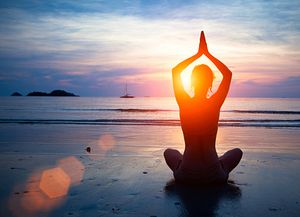The practice of yoga may bring inner peace. Now, however, it has become a cause of stress in India as of late. It is now India’s latest political fault line. Ever since the Indian government decided to celebrate International Yoga Day on June 21st on a massive, worldwide scale, a new debate has sprung up about the need for the government to push yoga on everyone. The issue has divided political parties and polarized people along religious lines.
The celebration of yoga is an initiative by Indian Prime Minister Narendra Modi and it was at his behest that the United Nations declared June 21st World Yoga Day. Over 190 countries, including 40 Muslim countries, supported the move to have a special day for yoga. The Indian government has set up a separate ministry for yoga last year called Ayush, headed by Shripad Yesso Naik, the Indian tourism minister.
Yoga, which traces its roots to ancient Indian texts, is a very popular form of exercise the world over. Its reach transcends religious and linguistic boundaries. In India, it’s a common sight to see people performing yoga every morning in public parks.
If this ancient exercise regime is already a rage among people world over, what’s the need for the Indian government to invest thousands of dollars to popularize it further yet? What is the need for the government to ask schools and offices to participate in yoga day? What is the need for this mass mobilization of yoga?
Critics say that Modi’s Yoga Day is part of the larger project by the right-wing government in Delhi to Hindu-ize India’s diversity and promote centralized uniformity in beliefs and practices. There is an attempt to link yoga with national pride as part of India’s ancient legacy. Any opposition toward the practice is branded as anti-national. Therefore, participation in Yoga Day has become, in a way, the yardstick of one’s patriotism.
A parliamentarian belonging to the ruling Bharatiya Janata Party (BJP) said recently that “those opposing yoga should either leave the country or drown themselves in the ocean.”
Historian Dilip Simeon writes that “this manufactured controversy,” is the “modus operandi” of the Hindu right-wing in India. In an article in the Indian Express, he says that “it is not wisdom that interests them, but the compulsory unification of thought and culture.”
The same opinion is held by the prominent Muslim scholar Zafarul Islam Khan, who says that India’s religious minorities do not have any opposition to yoga. “The problem is to bring religion into it,” he adds. The editor and publisher of The Milli Gazette, the first newspaper in English for Indian Muslims, Khan told The Diplomat that “attempts by the government to undermine diversity in the name of nationalism, including the ban on beef, opposition to serving eggs to students in schools, and the introduction of Hindu religious texts are an insult to the country’s cultural diversity. By Hindu-izing yoga the BJP is compelling Muslims to react.”
Shripad Yesso Naik, however, denies the allegations and notes that yoga has nothing to do with religion. “We are not forcing people to do yoga. Muslims are free to come and do yoga on June 21st. There is no religion to it,” asserts Naik. In an interview with The Diplomat, the minister says that “through yoga we want to propagate the virtue of good health.”
Meanwhile, the government is preparing for Yoga Day in the same way India celebrates Republic Day. All government offices and schools have been asked to hold yoga sessions in the morning on Sunday to mark the day. The main event is in New Delhi, where Prime Minister Modi will inaugurate the event at the capital’s landmark India Gate, where over 35,000 people are expected to participate. Indian embassies all over the world will also organize Yoga Day activities.
































